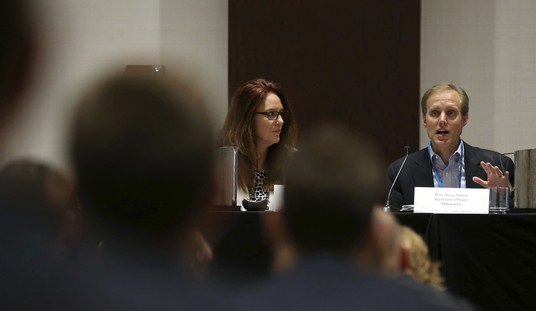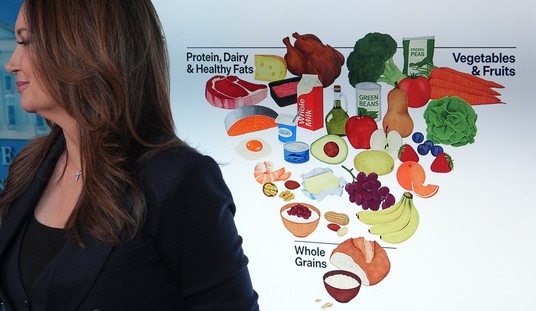Well, that $80 billion a year will come in handy, no? That’s the impression that six in ten Americans have as a solution to the trillion-dollar deficits in the latest Washington Post/ABC poll — and 39% of Republicans, too. The result demonstrates the political leverage of Democrats in the fiscal-cliff fight, and perhaps the leeway for the House GOP to compromise as well:
Sixty percent in this ABC News/Washington Post poll support raising taxes on incomes more than $250,000 a year, long a popular option overall, but also a divisive one: While 73 percent of Democrats and 63 percent of independents are in favor, far fewer Republicans, 39 percent, agree.
Interestingly, the move to limit deductions doesn’t get nearly as much support:
Americans divide on another item on the table, reducing income-tax deductions. In a question testing the concept generally – that is, without suggesting that wealthier Americans would be harder hit – 49 percent oppose limiting deductions, while 44 percent are in favor. On this option, strong opposition exceeds strong support, although intensity isn’t high on either side, 28 vs. 20 percent.
Partisan divisions on this question are less pronounced than they are on a tax hike for the better-off: Support ranges from 45 percent of Democrats and independents to 39 percent of Republicans; opposition, 48 to 51 percent across these groups. “Strong” opposition, likewise, is similar across partisan groups, 26 to 30 percent.
Does that make any sense at all? Part of the problem with the tax rates, from the populist point of view, is that the wealthy are perceived to have too many ways around them. That’s why Mitt Romney belatedly took up the cause of limiting deductions to a capped amount. That way one can limit the ability to shield income without having unpleasant conversations about the distortions provided by certain types of deductions.
Peter Orszag writes today at Bloomberg that these unpleasant conversations are the reason we won’t see deduction reform, even with a cap:
Let’s take a closer look at the effects of such a limit, though. In 2009, according to data from the Internal Revenue Service, taxpayers who itemized their deductions and had incomes of more than $200,000 had average deductions of $50,000 or more. For those with $200,000 to $500,000 in income, average deductions amounted to more than $51,000; from $500,000 to $1 million in income, the average was more than $100,000. At higher incomes, the averages rose further.
That households with incomes of more than $200,000 would be disproportionately affected by the deduction limit is neither surprising nor necessarily troublesome. Here comes the problem. In 2009, those taxpayers deducted more than $300 billion, 90 percent of which came from just three categories: taxes paid (mostly state and local taxes), home-mortgage interest and charitable contributions.
Of the big three, charitable giving is the most discretionary (unless a family moves to a smaller house with a smaller mortgage, or a city or state with lower taxes). The charitable sector thus has the most to lose from a limitation on itemized deductions.
How much money is involved? In 2009, households with incomes of more than $200,000 claimed almost $60 billion in charitable deductions — or about 20 percent of total charitable giving in the U.S. that year. Households with incomes of more than $10 million claimed an average of $1.75 million each in charitable donations in 2009, and they accounted for roughly 5 percent of all giving.
Charitable giving reacts to tax incentives, and in response to any limits on deductions it could even fall by about the same amount as the increase in the tax bill, according to John List of theUniversity of Chicago, who recently reviewed the literature on this subject. Other studies have suggested an effect about half as large. Even that smaller estimate, though, suggests that limiting deductions to $50,000 a year could easily reduce giving by tens of billions of dollars.
How long do you think it will take the charitable sector to figure this out?
Well, how about some simple entitlement reform — like raising the retirement eligibility age? That’s the most unpopular option of all, opposed by two-thirds of Democrats and Republicans:
Sixty-seven percent in this poll, produced for ABC by Langer Research Associates, oppose another suggestion, raising the Medicare eligibility age from 65 to 67. And on this idea, strong opposition surpasses strong support by more than 3-1, 49 to 14 percent.
Opposition to increasing the Medicare eligibility age crosses partisan and ideological lines; it’s 68 percent or more among Democrats and Republicans and liberals and conservatives alike. Instead views relate to age; opposition peaks at 78 percent among adults age 50-64. It’s also higher among women and people with less than $100,000 incomes, compared with men and the better-off.
Terrific. The only broad consensus for action is the populist tax-hike option which will solve less than 10% of the problem, and two-thirds won’t even take a basic step like mildly indexing retirement eligibility to life expectancy in order to reduce costs in the biggest fiscal train wreck of the federal budget.
If we could trade marginal tax-rate increases for real cuts in spending and actual entitlement reform that would end the long-term problems in Medicare, Medicaid, and Social Security, I’d take that trade, if somewhat reluctantly. This poll shows that Americans still have not come to grips with the scope and size of the problem … or even basic math.








Join the conversation as a VIP Member